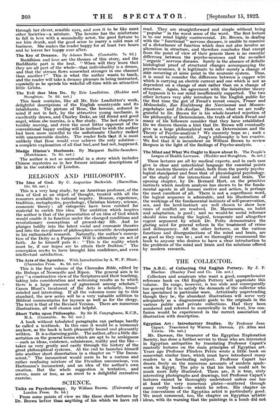SCIENCE.
' From some points of view we like these short lectures by Dr. Brown better than anything of his which we have yet read. They are straightforward and simple without being " popular " in the worst sense of the word. The first lecture is to our mind highly controversial. _Dr. Brown, in _dealing with the " functional nervous diseases, is unable to conceive of a disturbance of function which does not also involve an alteration in structure, and therefore concludes that except from the point of view of their genesis there is no essential difference between the psycho-neuroses and the so-called "organic " nervous diseases. Surely in the absence of definite histological proof of structural changes accompanying thci psycho-neuroses, it is legitimate to infer merely a change oh state occurring at some point in the neuronic system. Thus, it is usual to consider the difference between a copper wire which is carrying an electric current and one which is not 'as dependent on a change of state rather than on a change of structure. Again, his agreement with the Salpetriere theory of hypnosis is to our mind insufficiently supported. The two other lectures very ably introduce to the English public for the first time the gist of Freud's recent essays, Trauer und Melancholic, Zur. Einh-thrung des Narcissmus and Massen- psychologie und Ich-Analyse. However, what we are really grateful to Dr. Brown for is his whole-hearted rejection ol
the philosophy of Determinism, the truth of which Freud and many of his followers consider that they have established. Do we discern therein a hint that Dr. Brown will eventually give u,s a large philosophical work on Determinism and the Theory of Psycho-analysis ? We sincerely hope so ; such s
work is certainly needed. Jung's philosophy is *too evasive. We feel that it is incumbent on William Brown to review Bergson in the light of the findings of Psycho-analysis.


































 Previous page
Previous page